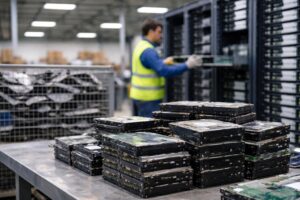Third-party logistics providers (3PLs) are becoming crucial in achieving net-zero supply chains. Once known primarily for their efficiency in moving goods, these intermediaries are now leading a green logistics revolution. 3PLs have enormous supply chains, cutting-edge technology, and a strong network. This allows them to cut carbon emissions dramatically.
Companies are constantly tackling the complexity that sustainability initiatives are bringing. Amidst this, 3PLs are offering innovative solutions that are beyond traditional logistics. This article dives into how 3PLs are changing the supply chains and are contributing g to a more sustainable future in global trade.
Net-Zero Supply Chains: 3PLs Revolutionizing Transportation
3PLs’ sustainability initiatives are mostly focused on the transportation sector. This is because it is one of the main causes of carbon emissions worldwide. Moreover, these logistics firms are profoundly changing how goods are shipped around the world. This is by putting creative ideas into practice and making use of their vast networks. Let’s know about it more in-depth:
Alternative Fuel Vehicles
3PLs are setting the standard for accepting and promoting alternative fuel vehicles. Many are making significant investments in hydrogen fuel cell cars, electric trucks, and even the investigation of biofuel alternatives. For example, several top 3PLs have pledged to switch to electric cars for a sizable percentage of their fleets by 2030. As a result, this change not only lowers direct emissions but also pushes businesses to produce cleaner transportation technology faster and more affordable.
Optimized Route Planning
Route planning is being optimized by 3PLs using AI-powered technologies and sophisticated algorithms. Furthermore, these advanced systems find the best fuel-efficient routes. This is by taking into account variables like weather, delivery windows, and traffic patterns. Moreover, 3PLs can reduce fuel usage and pollutants. This can be done by eliminating needless driving and idle time. Some businesses claim that only with the optimized route, they save up to 15% on gasoline.
Intermodal Transportation
Intermodal transportation solutions are being promoted by 3PLs. It combines many modes of transportation to maximize efficiency and reduce environmental effects. For instance, employing trucks for last-mile delivery and rail for long-distance travel can reduce carbon emissions by up to 75%. This is when compared to long-distance travel alone. Furthermore, third-party logistics in sustainable supply chains have connections to a variety of carriers and are skilled at handling diverse shipping scenarios. They are therefore qualified to manage these intricate logistics.
Net-Zero Supply Chains: Transforming Warehousing and Distribution
3PLs can significantly boost the sustainability of the supply chain in crucial areas like distribution and warehousing facilities. Moreover, these logistics hubs are becoming role models for efficiency and environmental responsibility. This is by adopting green technology and practices. So, let’s see what are they:
Energy-Efficient Facilities
Many 3PLs are making their warehouses greener. This is what they do when they construct new ones or renovate existing ones. To save energy, they are adding smart heating and cooling systems, solar panels, and LED lighting. Moreover, warehouses are now creating as much energy as they are consuming in some situations. This energy situation is known as net zero.
Automated Storage and Retrieval Systems
New tech is changing how warehouses work. These systems, called AS/RS, use way less energy and make things run smoother. They also mean warehouses can be smaller. This means less space to light up, heat, and cool. These systems also cut down on the need for energy-hungry machines like forklifts. All of this helps reduce emissions.
Sustainable Packaging Solutions
3PLs are working hard to cut down on packaging waste. A significant portion of supply chain emissions are caused by this waste. Furthermore, more and more 3PLs are now providing environmentally friendly packaging alternatives to their clients. This includes items like naturally degradable materials, reusable containers, and precisely sized packaging to save waste. Some 3PLs have even set up their teams to design packaging. These teams come up with special, eco-friendly solutions that fit what their clients need.
Net-Zero Supply Chains: 3PLs Leveraging Data and Technology
Data and technology are effective instruments in the digital era for pursuing sustainability. 3PLs are utilizing these assets to promote accountability, transparency, and efficiency throughout supply chains. So, let’s see how:
Carbon Footprint Tracking
3PLs are using sophisticated monitoring systems to track and report on carbon emissions along the whole supply chain. These systems offer up-to-date information on emissions resulting from various logistical operations. It includes transportation and warehousing. Moreover, 3PLs help their clients make educated decisions about their supply chain operations. They also pinpoint areas for improvement by providing this degree of insight. Additionally, customers can select lower-emission choices by using the carbon rating that certain 3PLs offer for various delivery options. This is one of the most powerful ways of achieving Net-Zero Emissions through 3PLs.
Demand Forecasting Through Predictive Analytics
3PLs are reducing overproduction and needless transportation by utilizing predictive analytics to enhance demand forecasts. Furthermore, these algorithms can more accurately forecast demand. This is by examining industry patterns, historical data, and even the mood expressed on social media. So, this facilitates improved inventory control and less waste in the supply chain. According to certain 3PLs, their predictive analytics tools have assisted customers in cutting surplus inventory by up to 30%. This has resulted in notable decreases in emissions from storage and transportation leading to net-zero supply chains.
Supply Chain Transparency with Blockchain
Many third-party logistics in sustainable supply chains are using blockchain technology. This is to increase supply chain transparency and traceability. This system creates an immutable record of each movement and transaction that occurs along the supply chain. This can be used to confirm sustainability claims and guarantee that environmental laws are being followed. For instance, a blockchain-based system could supply a comprehensive emissions history for a product from production to distribution. To make sure that raw resources come from sustainable sources, it can also monitor their provenance.
Collaborative Approaches Of 3PLs For Sustainability
Achieving net-zero supply chains requires teamwork among various stakeholders and industries. Furthermore, 3PLs are in a unique position to encourage these collaborations and mobilize group efforts toward sustainable objectives.
Industry Partnerships
To create and deploy sustainable solutions, several 3PLs are partnering with carriers, industry peers, and technology suppliers. These partnerships frequently center on exchanging best practices and combining resources for R&D. It also centers on developing sustainable standards that apply to the whole sector. For example, several top 3PLs are joining forces to create a common technique for measuring and disclosing emissions from the supply chain. This will improve industry transparency and comparability.
Client Education and Engagement
3PLs are assuming the role of sustainability consultants. This is by teaching their clients about the value of net-zero supply chains and pointing them in the direction of more sustainable practices. Furthermore, this entails creating specialized plans. This is to assist clients in reducing their environmental effects, as well as delivering sustainability reports and courses. To assist their clients assess their progress and pinpoint areas for improvement, several 3PLs have even developed sustainability scorecards.
Government and NGO Collaboration
Since many 3PLs understand how crucial policies are to promoting sustainability, they are actively interacting with governmental and non-governmental NGOs. These partnerships sometimes entail participating in policy debates, funding research projects, and testing novel technology. This makes achieving Net-Zero Emissions through 3PLs effective. For instance, some 3PLs collaborate with urban municipal governments to test low-emission zones. Moreover, others are teaming up with environmental non-governmental organizations to create more precise carbon accounting techniques.
To Sum Up
The role of 3PLs in reaching net-zero supply chains is important and complex. They are changing transportation, improving warehousing, using new technology, and encouraging teamwork. These logistics providers are making a big impact in the industry. To attain a sustainable future, it is necessary to involve logistics providers (3PLs) in dealing with the difficulties of carbon reduction in supply chains.
To learn more about these topics and see the latest in sustainable supply chain management, consider attending the Net-Zero Supply Chain Summit in Amsterdam, Netherlands on September 12-13, 2024. It’s a great chance to meet and interact with top experts, learn new strategies, and pick up practical tips to help your company go green. So, be a part of this conversation concerning net-zero supply chains’ future which is scheduled to take place soon.




